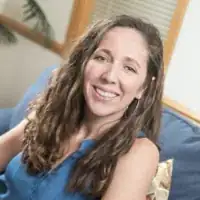This article was co-authored by Tara Vossenkemper, PhD, LPC and by wikiHow staff writer, Hannah Madden. Dr. Tara Vossenkemper is a Licensed Professional Counselor and the Founder and Managing Director of The Counseling Hub, LLC, a group counseling practice located in Columbia, Missouri. She is also the Founder of and a Business Consultant with Tara Vossenkemper Consulting, LLC, a consulting service for therapy practice owners. With over nine years of experience, she specializes in using the Gottman Method of relationship therapy with couples on the brink of divorce, who have conflict, or who feel disconnected from one another. Dr. Vossenkemper holds a BA in Psychology from The University of Missouri, Saint Louis, an MA in Counseling from Missouri Baptist University, and a PhD in Counselor Education and Supervision from The University of Missouri, Saint Louis. She has also completed Level 3 training in the Gottman Method Couples Therapy approach and has been formally trained in both the Prepare-Enrich Premarital Couples Counseling approach and the PREP Approach for couples counseling.
There are 7 references cited in this article, which can be found at the bottom of the page.
This article has been viewed 47,742 times.
Confronting someone about cheating is hard enough, but how do you know if they’re telling the truth? All relationships have issues from time to time, but being cheated on can really be a big blow to your healthy partnership. That’s why we’ve compiled everything you need to know so you can figure out if your partner is lying about cheating on you.
Steps
Expert Q&A
-
QuestionHow can you tell if someone is guilty of cheating?
 Tara Vossenkemper, PhD, LPCDr. Tara Vossenkemper is a Licensed Professional Counselor and the Founder and Managing Director of The Counseling Hub, LLC, a group counseling practice located in Columbia, Missouri. She is also the Founder of and a Business Consultant with Tara Vossenkemper Consulting, LLC, a consulting service for therapy practice owners. With over nine years of experience, she specializes in using the Gottman Method of relationship therapy with couples on the brink of divorce, who have conflict, or who feel disconnected from one another. Dr. Vossenkemper holds a BA in Psychology from The University of Missouri, Saint Louis, an MA in Counseling from Missouri Baptist University, and a PhD in Counselor Education and Supervision from The University of Missouri, Saint Louis. She has also completed Level 3 training in the Gottman Method Couples Therapy approach and has been formally trained in both the Prepare-Enrich Premarital Couples Counseling approach and the PREP Approach for couples counseling.
Tara Vossenkemper, PhD, LPCDr. Tara Vossenkemper is a Licensed Professional Counselor and the Founder and Managing Director of The Counseling Hub, LLC, a group counseling practice located in Columbia, Missouri. She is also the Founder of and a Business Consultant with Tara Vossenkemper Consulting, LLC, a consulting service for therapy practice owners. With over nine years of experience, she specializes in using the Gottman Method of relationship therapy with couples on the brink of divorce, who have conflict, or who feel disconnected from one another. Dr. Vossenkemper holds a BA in Psychology from The University of Missouri, Saint Louis, an MA in Counseling from Missouri Baptist University, and a PhD in Counselor Education and Supervision from The University of Missouri, Saint Louis. She has also completed Level 3 training in the Gottman Method Couples Therapy approach and has been formally trained in both the Prepare-Enrich Premarital Couples Counseling approach and the PREP Approach for couples counseling.
Licensed Professional Counselor It depends on what you define as cheating. I usually define it as when there is an element of secrecy and emotional connection and secrecy with another person outside of the relationship.That's at least an emotional affair, even though some people might not consider it cheating per se.
It depends on what you define as cheating. I usually define it as when there is an element of secrecy and emotional connection and secrecy with another person outside of the relationship.That's at least an emotional affair, even though some people might not consider it cheating per se. -
QuestionHow do I confront my cheating partner?
 Tara Vossenkemper, PhD, LPCDr. Tara Vossenkemper is a Licensed Professional Counselor and the Founder and Managing Director of The Counseling Hub, LLC, a group counseling practice located in Columbia, Missouri. She is also the Founder of and a Business Consultant with Tara Vossenkemper Consulting, LLC, a consulting service for therapy practice owners. With over nine years of experience, she specializes in using the Gottman Method of relationship therapy with couples on the brink of divorce, who have conflict, or who feel disconnected from one another. Dr. Vossenkemper holds a BA in Psychology from The University of Missouri, Saint Louis, an MA in Counseling from Missouri Baptist University, and a PhD in Counselor Education and Supervision from The University of Missouri, Saint Louis. She has also completed Level 3 training in the Gottman Method Couples Therapy approach and has been formally trained in both the Prepare-Enrich Premarital Couples Counseling approach and the PREP Approach for couples counseling.
Tara Vossenkemper, PhD, LPCDr. Tara Vossenkemper is a Licensed Professional Counselor and the Founder and Managing Director of The Counseling Hub, LLC, a group counseling practice located in Columbia, Missouri. She is also the Founder of and a Business Consultant with Tara Vossenkemper Consulting, LLC, a consulting service for therapy practice owners. With over nine years of experience, she specializes in using the Gottman Method of relationship therapy with couples on the brink of divorce, who have conflict, or who feel disconnected from one another. Dr. Vossenkemper holds a BA in Psychology from The University of Missouri, Saint Louis, an MA in Counseling from Missouri Baptist University, and a PhD in Counselor Education and Supervision from The University of Missouri, Saint Louis. She has also completed Level 3 training in the Gottman Method Couples Therapy approach and has been formally trained in both the Prepare-Enrich Premarital Couples Counseling approach and the PREP Approach for couples counseling.
Licensed Professional Counselor Instead of making accusations, try phrasing the discussion avoiding "you" sentences, as they lay blame on the other person and may make them get defensive right away, which is counterproductive.
Instead of making accusations, try phrasing the discussion avoiding "you" sentences, as they lay blame on the other person and may make them get defensive right away, which is counterproductive.
References
- ↑ https://www.urmc.rochester.edu/encyclopedia/content.aspx?contenttypeid=1&contentid=528
- ↑ https://time.com/5443204/signs-lying-body-language-experts/
- ↑ https://www.urmc.rochester.edu/encyclopedia/content.aspx?contenttypeid=1&contentid=528
- ↑ https://www.apa.org/monitor/julaug04/detecting
- ↑ https://time.com/5443204/signs-lying-body-language-experts/
- ↑ https://www.urmc.rochester.edu/encyclopedia/content.aspx?contenttypeid=1&contentid=528
- ↑ Tara Vossenkemper, PhD, LPC. Licensed Professional Counselor. Expert Interview. 18 January 2022.
- ↑ https://www.apa.org/monitor/julaug04/detecting
- ↑ https://www.apa.org/monitor/julaug04/detecting
- ↑ https://psychcentral.com/blog/recovering-narcissist/2018/08/5-signs-youre-dating-a-cheating-narcissist#5.-You-catch-them-chronically-lying-often-for-no-good-reason.
- ↑ Tara Vossenkemper, PhD, LPC. Licensed Professional Counselor. Expert Interview. 18 January 2022.
- ↑ https://www.psychologytoday.com/us/blog/love-and-sex-in-the-digital-age/201812/10-signs-your-spouse-is-cheating
- ↑ Tara Vossenkemper, PhD, LPC. Licensed Professional Counselor. Expert Interview. 18 January 2022.
- ↑ https://www.besthealthmag.ca/list/signs-of-infidelity/
- ↑ https://www.psychologytoday.com/us/blog/love-and-sex-in-the-digital-age/201812/10-signs-your-spouse-is-cheating







































































